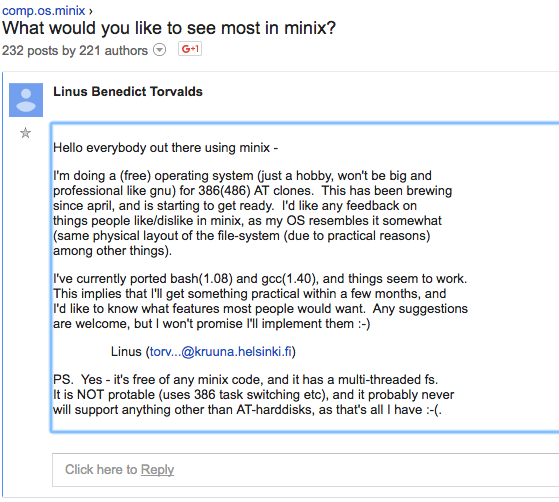Linux celebrates its 25th birthday today
The open source operating system is still getting 4,000 new lines of code a day

Today marks 25 years since Linus Torvalds sent out his industry-changing message, asking for help testing a new operating system he had devised.
On 25 August, 1991, he wrote: "I'm doing a (free) operating system (just a hobby, won't be big and professional like gnu) for 386(486) AT clones. This has been brewing since april, and is starting to get ready. I'd like any feedback on things people like/dislike in minix, as my OS resembles it somewhat (same physical layout of the file-system (due to practical reasons)among other things)."

That operating system, Linux, went on to change the world of computing, becoming the major open source alternative to corporate giants like Microsoft's Windows OS.
Today, its reach is far and wide. For instance, Google's open source Android operating system is based on Linux, giving Linux the largest installed base of mobile users around the world.
Linux owes much of its popularity to its open source nature. Letting other developers tinker and tweak with the original OS has led to dozens of different commercial versions of Linux known as distributions such as Ubuntu, openSUSE, CentOS and Red Hat Enterprise Linux.
That innovation around the Linux kernel continues today. To mark the 25th anniversary, the Linux Foundation released a Linux Kernel Development report stats showing that more than 13,500 developers from 1,300 companies have contributed to the Linux kernel since 2005.
"Even after 25 years, Linux still serves as an example of how collaborative development can work, which can be applied to other open source projects," said Jim Zemlin, executive director of the Linux Foundation.
Get the ITPro daily newsletter
Sign up today and you will receive a free copy of our Future Focus 2025 report - the leading guidance on AI, cybersecurity and other IT challenges as per 700+ senior executives
That development leads to a new kernel release every eight to 12 weeks, the report shows, with that time period striking a balance between providing enough time to find problems and being short enough that the workload does not become too unwieldy.
The lines of code in the kernel have increased substantially too it now has 22 million lines of code, compared to just 10,000 lines of code in the 0.01 version. Linux developers now add on average 4,000 lines of code a day.
The biggest contributors to Linux are large companies Intel contributed 13% of changes between versions 3.19 and 4.7, closely followed by Red Hat at 8%, Samsung at 3.9%, IBM at 2.7% and Google at 2%.
"Above all, 25 years of kernel history show that sustained, cooperative effort can bring about common resources that no group would have been able to develop on its own," the report concluded.
-
 Meta just revived plans to train AI models using European user data
Meta just revived plans to train AI models using European user dataNews Meta has confirmed plans to train AI models using European users’ public content and conversations with its Meta AI chatbot.
By Nicole Kobie
-
 AI is helping bad bots take over the internet
AI is helping bad bots take over the internetNews Automated bot traffic has surpassed human activity for the first time in a decade, according to Imperva
By Bobby Hellard
-
 Tiny11 review: Windows 11 with only 2GB of RAM
Tiny11 review: Windows 11 with only 2GB of RAMReview A version of Windows 11 for older machines that don't meet the full requirements
By Nik Rawlinson
-
 Red Hat Enterprise Linux becomes foundational operating system for Cohesity Data Cloud
Red Hat Enterprise Linux becomes foundational operating system for Cohesity Data CloudNews New strategic partnership between Red Hat and Cohesity aims to drive innovation in the data security and management space
By Daniel Todd
-
 Ubuntu shifts to four-week update cycle
Ubuntu shifts to four-week update cycleNews Critical fixes will also come every two weeks, mitigating the issues involved with releasing prompt patches on the old three-week cadence
By Richard Speed
-
 AlmaLinux follows Oracle in ditching RHEL compatibility
AlmaLinux follows Oracle in ditching RHEL compatibilityNews Application binary compatibility is now the aim with 1:1 now dropped
By Richard Speed
-
 How big is the Windows 10 cliff-edge?
How big is the Windows 10 cliff-edge?ITPro Network With some comparing the upcoming Windows 10 end of life to Windows XP, we ask members of the ITPro Network for their insight
By Jane McCallion
-
 Everything you need to know about the latest Windows 11 updates - from bug fixes to brand-new features
Everything you need to know about the latest Windows 11 updates - from bug fixes to brand-new featuresNews Two new cumulative updates are on the way and will be installed automatically on Windows 10 and Windows 11 machines
By Rory Bathgate
-
 How to download a Windows 11 ISO file and perform a clean install
How to download a Windows 11 ISO file and perform a clean installTutorial Use a Windows 11 ISO to install the operating system afresh
By John Loeppky
-
 We could all benefit from better Windows and macOS accessibility features
We could all benefit from better Windows and macOS accessibility featuresOpinion Today’s accessibility features can help you work through a nasty injury, but there’s still plenty of room for improvement
By Barry Collins